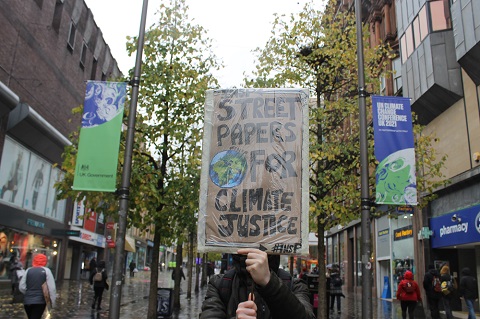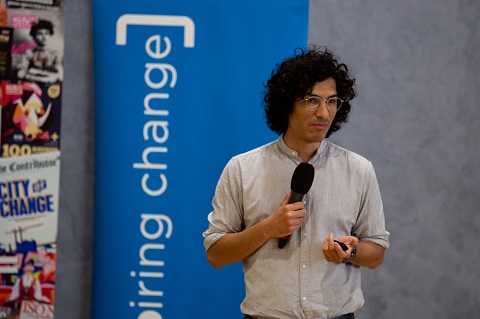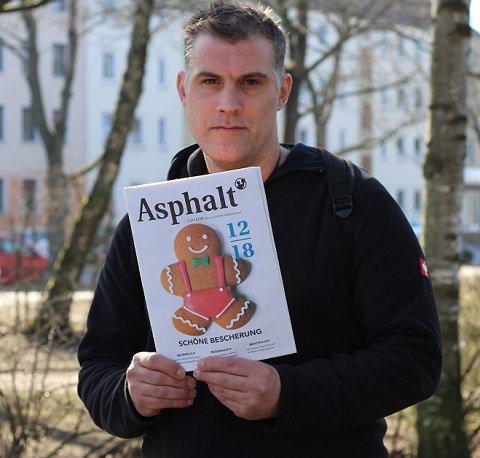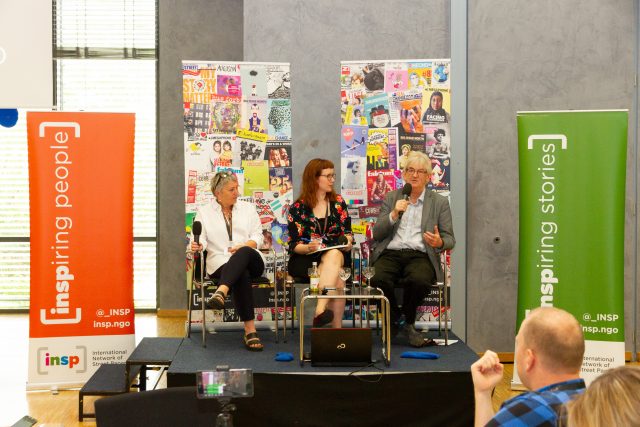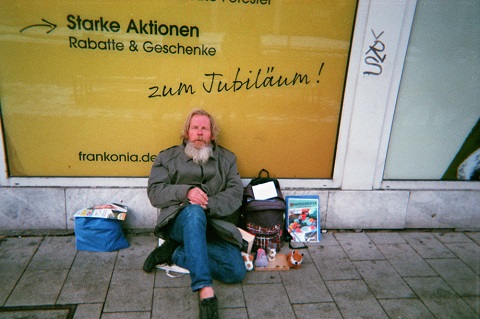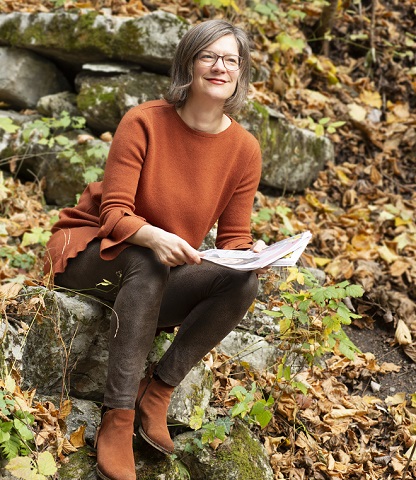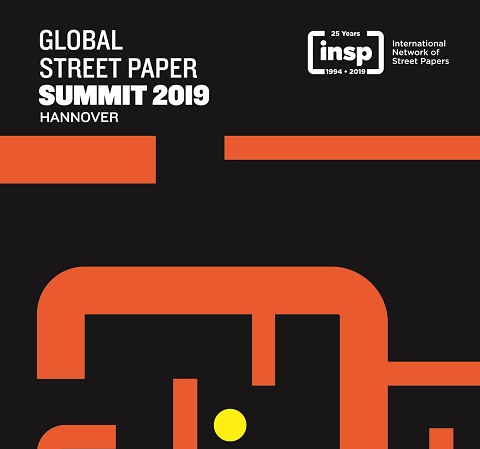When Sunny Hundal spoke at the Global Street Paper Summit in Glasgow this summer, you’d be right in thinking that the barbs he dished out to his attentive audience were deliberately combative. To be content in your social, cultural and political convictions and then be told you’re doing it wrong is not an easy provocation to take. But that’s what the journalist and activist’s opening gambit consisted of: “We are all being radicalised and we don’t know how to stop it”.
His point, though ostensibly confrontational and isolating, actually has the goal of bringing people together. We live in a chaotic period of human history, and our response to opposing, in many cases abhorrent, worldviews, Hundal says, is too emotional and fraught. We should be engaging in a productive and mannered dialogue; reaching across the table to those we disagree with, attempting to understand where they are coming from and showing them that our conflicting stance is trustworthy. Or, as Hundal tells #INSP2018 delegates: “We are faced with an avalanche of shit every day, but we all need to calm the fuck down.” As he tells it, fear, hatred and aggression, from any source, breeds just more fear, hatred and aggression, and we no longer have the desire to engage in the nuances of real, substantive debate, and instead revert to name-calling and frustration.
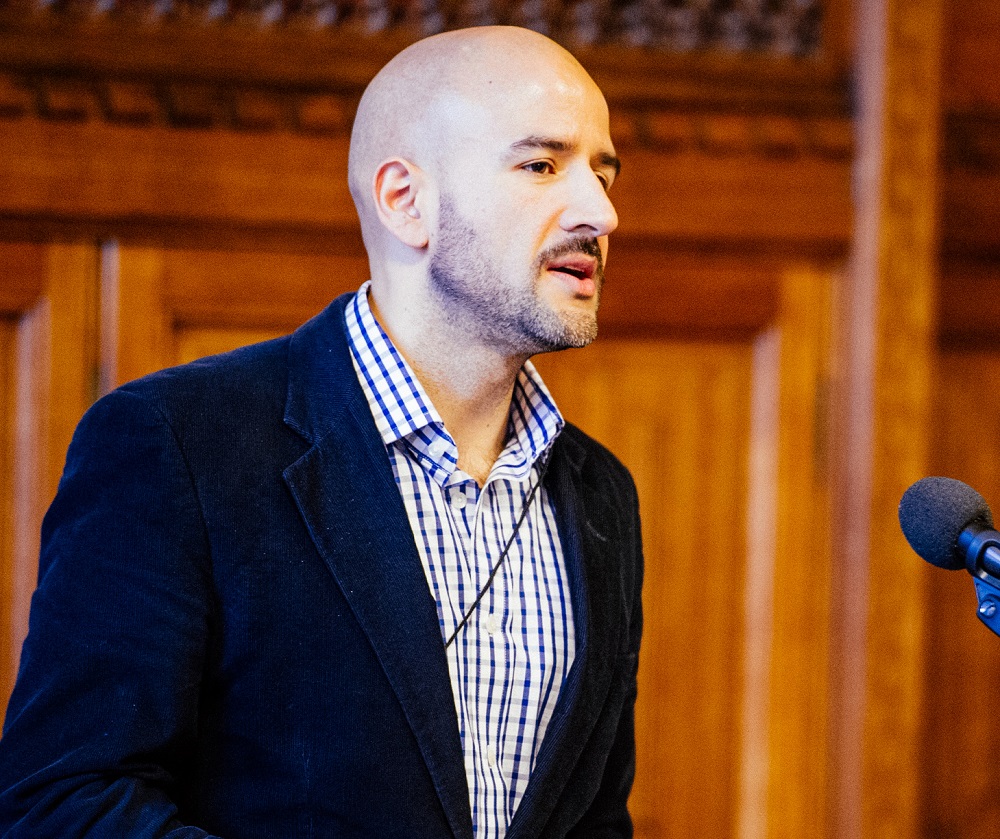
It’s not a complex idea, but it is, in our modern age, a difficult one to get on board with. To be surrounded by increasingly public shows of bigotry, a rise in the visibility of religious and racial extremism and the continued subjugation of marginalised groups, and not react immediately and, in some cases, viciously? As Hundal says, people are emotional beings – it’s not in our nature.
To say this to assorted street paper staff adds another level of confusion. This is a group which shares a social cause and, likely but not exclusively, a political persuasion, which is being constantly attacked by populist, right wing politicians and media personalities. Especially in the US, street papers are faced with a political administration intent on forgetting about those at the fringes of society. Despite this, street papers, those who create them, and the vendors who sell them, do reach across the table, by empowering the kinds of marginalised people that certain groups in society stigmatise and dismiss. In fact, the concept of pulling yourself out of poverty is one that conservative leaning individuals can properly get on board with, even if it’s from the position of: “that’s perfect, now we don’t need to worry about them”. Individuals may be “radicalised” against the right when espousing thoughts and opinions, but in practice are simply taking control of a situation to make a change when none is forthcoming from across the boundary.
After his speech, Hundal agrees that street paper people could be forgiven for finding this accusation levelled against them, at best, disagreeable. But also, that it proves his point. “I can totally understand why so many left wing people feel that the main issues that are concerning our economy or our people are being ignored while everyone’s bloody arguing about race and religion. I don’t want to do that either – these are silly arguments and what’s important is solving real problems within our community.”
Hundal is no stranger to the effects of radicalisation. His family, of Sikh and Indian heritage, experienced discrimination due to their religion when he was a boy. Describing what it was like to have to flee persecution, he said: “What was frightening was that overnight, people were willing to turn on their neighbours and kill them. People they had known for ten, twenty years. It’s frighteningly easy to radicalise people very quickly. And it’s the same with today’s issues. It’s so easy to go along with radicalisation and anger regardless of where you are on the political spectrum, and we find it so much harder to resist that temptation, and instead sit back and think more deeply about issues.”
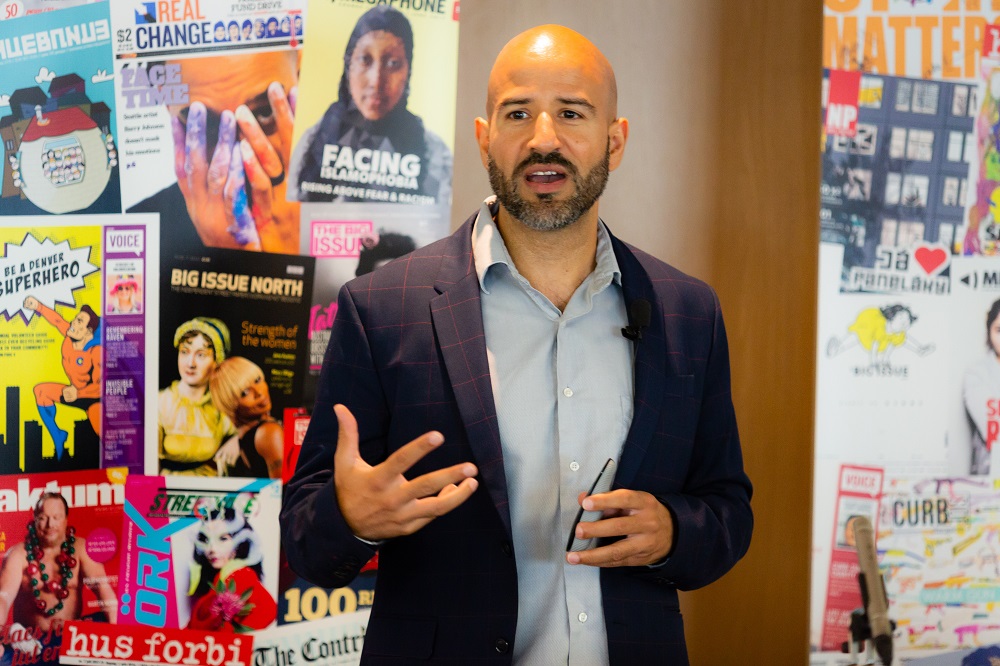
This outlook comes wrapped in Hundal’s admittedly controversial ideas around identity politics. He has been writing for various media outlets, both mainstream and otherwise, as a journalist and commentator for over a decade, and now believes that a sharp focus on identity politics, and society’s unwillingness to come together, is contributing to the kinds of barriers that rise up in the midst of radicalisation.
It’s hard to challenge, from my privileged position of a straight, white man, views on identity from someone who may have been pigeonholed by their religion and race throughout their life and career whilst simultaneously trying to transcend that identity. At the same time, it is hard to compute a criticism of the rise of identity politics while specific groups within society are constantly othered – whether that’s through the mass incarceration of black people, travel bans on Muslims, calling Mexicans rapists, or threats to the bodily autonomy of women, in the US; or the anti-immigrant tendencies stoked by Brexit in the UK, and by the refugee crisis in Europe. In 2018, people are finally being empowered by their identity rather than feeling a need to mask or diminish it, and surely that’s a good thing?
Hundal understands why his views are controversial, but insists that he is not against identity politics. Rather, he believes identity can be used in more fruitful ways. “The main issues in society – housing, homelessness, poverty, inequality – are not on the agenda because we’re not building a cross-community alliance of people and saying let’s bring folks together and talk about the real issues that are blighting our community, rather than arguing about identity.
“It’s not that I’m against identity politics, I absolutely feel like we have to understand it. That’s why I go round telling people we have to get to grips with identity politics, and then address and change our language so that those issues are diffused and we can focus on the real issues.”
Hundal takes the street paper mission of fighting against poverty, homelessness and social exclusion as an example. “If I was working in Manchester or Birmingham, wherever, I would go around Imams and Sikh temples and the people there and say let’s talk about homelessness in the community. There are some Sikh groups in the UK doing fantastic work around homelessness by putting on street kitchens. They go to areas and help people and distribute free food to them, then put videos of this on the internet, which go viral, and people think this is great, that this particular community are helping these people in need, from across communities. For Sikhs, it’s a source of pride – they feel like they are showing people that this is what our religion, one many people misunderstand, is about at the core.
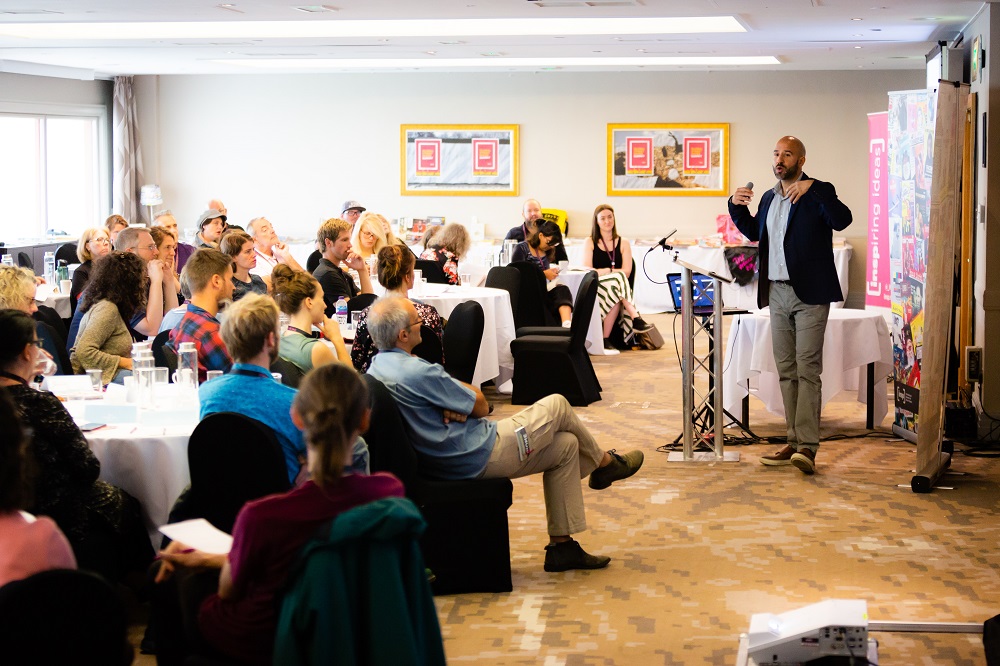
“The problem is mainstream homelessness organisations are not approaching those types of people and asking how they can work together and turn this into a nationwide thing. So that people feel ‘oh, this is amazing, Hindu, Muslim and Sikh organisations have come together to beat homelessness. Why? Because there are so many people who are poor and homeless in cities on any given night’. You raise those issues. So you’re reaching new audiences and elevating the conversation about what has to be done.
“So, I say, use identity politics to get to new communities and change the conversations in those communities. But because we’re not doing that, the argument just always becomes about silly stupid stuff. Let’s build alliances, understand those people, and work together.”
Hundal describes himself as an activist journalist and, while he doesn’t out right reject identity politics, it’s understandable that his scepticism of its role in society sits uneasily with others, many of whom also have an activist sensibility.
Juxtaposing his ideas of peace and unity between communities of differing values and politics is his perception of the role of the mainstream media. Like street papers, Hundal sees himself as part of an alternate media – he is currently an editor at independent platform openDemocracy, and editor-in-chief of Barfi Culture, an online publication which tells stories from the perspective of the South Asian diaspora – and believes it has a defining, but evolving, role in how news is reported and important stories are told. Namely, this is to do with the idea of balance, and the lengths to which news outlets will go to keeping within traditional journalistic structures and values around it. Depending on how you view it, the New Yorker’s attempts to include former Breitbart executive chairman, White House chief strategist, and far-right propagator, Steve Bannon, on its festival programme epitomises this notion of striving for balance.
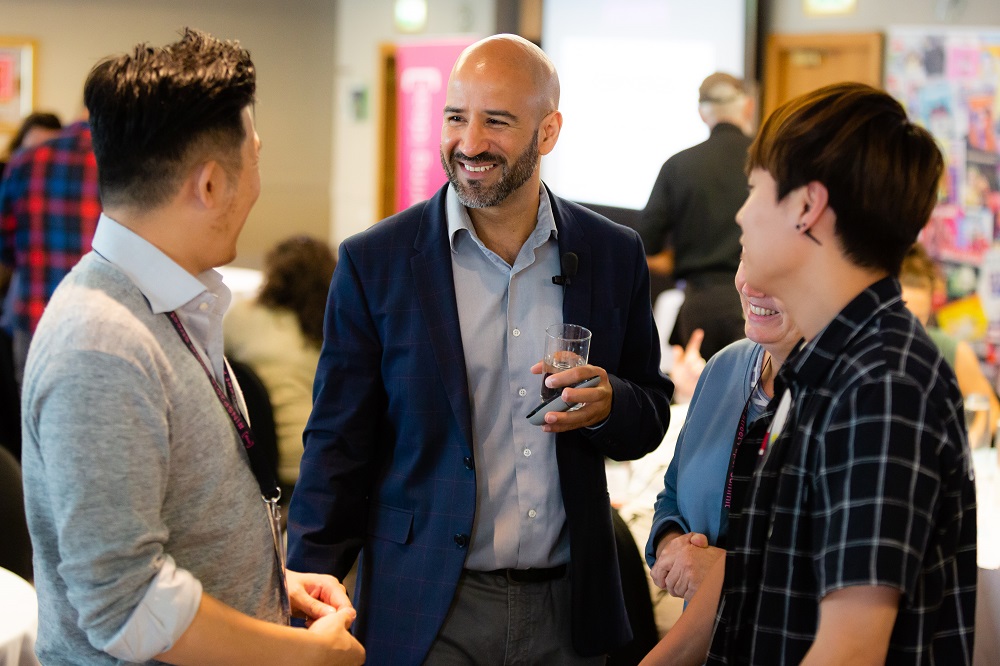
“Mainstream media journalists are obsessed by balance,” says Hundal. “It constantly feels like it has to be neutral, even when it gives voice to, and reacts against, trolling by successful crazy people. We have to ask the mainstream media to do better and say’ your framing of debates is old’. I think this is where street papers, and alternative media generally, can play a very strong role, by saying the debate being had is silly and we can show you a different, better, more in keeping with the times, way to do it. That’s what I’m trying to do with Barfi Culture – showing different stories, and framing different debates in different ways, and so not adopt this false balance.”
On the face of it, the idea of doing away with an excessive emphasis on balance in our daily news, at worst, contradicts the idea that we should engage more with conflicting opinions. However, as Hundal explains it, his ideas are not so much about giving voice to extremists, as they are bringing groups in from the cold that have been isolated because of their opinions, in an attempt to make progress on broader societal issues.
“As the alternative media, I feel we have more of a responsibility to try and drive the conversation out in different ways rather than feeling that polarisation,” he says. “I know that it’s very easy to be the champion of the resistance, so to speak, and then it’s easy to build up a readership based on that. But that’s what the New York Times and Washington Post are doing. They’re saying we have the resources to take down the Trump administration from a media perspective, so that’s why you must support us. That’s their basic line. The right wing can see that and so that’s why they don’t trust them.
“The debate has become so toxic that even talking across the aisle as allies is too dangerous. People find it too dangerous to say ‘the white working class should be our allies’. That’s a toxic atmosphere. We have to break that down, get some people on board, and build a broader community.”
While it may be difficult to fully agree with Hundal’s perspective, his argument that people should hash out differences more peacefully, and with a greater sense of a collective oneness, a community, is an inarguably noble, if idealistic, one.
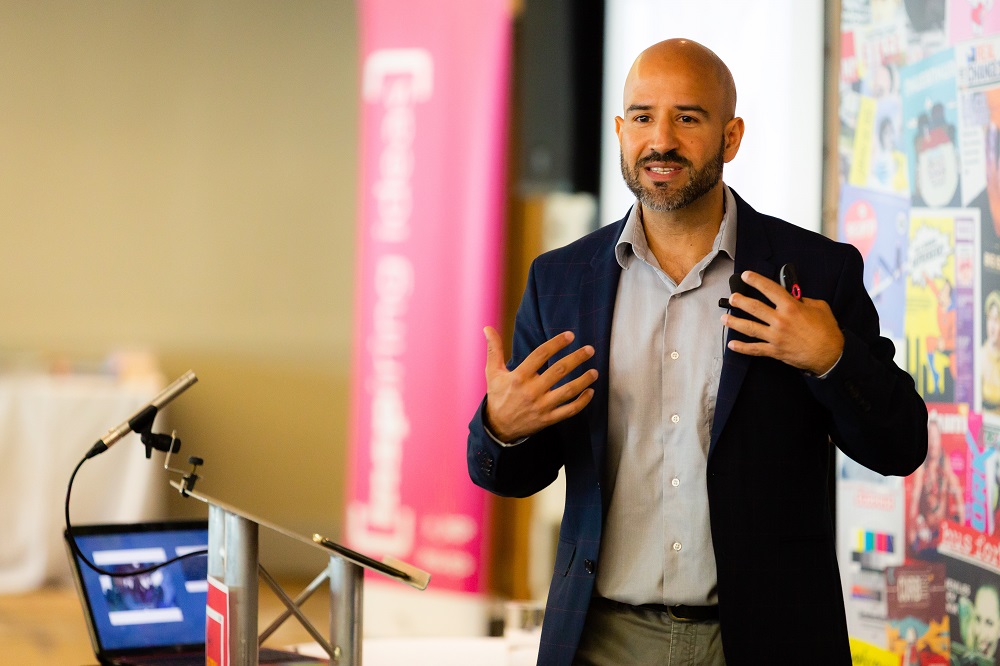
He continues: “I’m in journalism like most people: we want to tell the truth about what is really going on in society, to champion the voiceless. So, I feel like the world should be a better place, and I’m fighting for that world through journalism.
“I’ve spent time being threatened for raising awareness of extremists of all kinds. In the last few years, I have gone in a different direction because I see the conversation happening as a result of Trump and the radicalisation that is happening of people, and that’s a very toxic environment. It’s tempting to get involved in that conversation and fight for your side, for your community, but all it leads to is: we lose. If you think about what happens ten or twenty years down the line, on the big issues we will lose because of triggering and being baited into confrontation. So you have to start doing things differently – the world has changed. We are currently playing their game and as alternative media we have to avoid that trap.”
INSP Members can download this article from the INSP News Service here.





